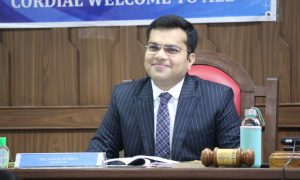This interview has been published by Prabhjot Singh, Priyanka Karwa and The SuperLawyer Team

Let’s start from the beginning – What prompted you to choose law? Was choosing law came naturally or it felt easy to adapt?
I was fascinated by the unique oratory prowess of lawyers and prestige and nobility they enjoy in the society.
What was your Law School journey like? Was Law School where you first tried a hand at writing?
Nigerian Law School is one of the most difficult law schools in the world. There are lot of materials to cover within a very short period of time. I started writing after my law school
Kindly brief us about your initial struggles in the beginning of your professional career.
It was difficult adapting to the practice aspect of the profession. I noticed a big gap in what we were taught and what is obtainable in practice. It was more like unlearning and re-learning. For instance, Faculties of law in Nigeria do not have any tech law related courses on the curricula, including law school. Anyone aspiring a career in Tech Law would either travel oversee or leverage online course platform to learn about it. I started off by taking courses on Coursera, Udemy, Future learn and the likes..
Tell us about your current role and how do you plan your day?
I practice as a Barrister and Solicitor. In my firm, I am a member of the litigation as well as commercial law team. In the transaction team, I advise on Capital Market, Mergers and Acquisitions, Data Protection, Financial Technology/ Blockchain, Intellectual Property and Start-ups Generally. I also do the litigation aspect of these areas. However, I am very intentional about building my career around Technology Law.
Why do you choose Technology Law over other sectors? What made you interested in that domain?
There is a paradigm shift towards digital economy. I once read a report that stated that 20% of the world economy is digital whereas the remaining 80% runs on digital platform. What this tells is that tech law is the present and the future and this is what prompted my interest in the area.
Do you think Technology sector and the opportunities in its legal side will continue to grow in the coming years? If yes, please explain it to us.
Yes, there is because there is a paradigm shift towards digital economy. I once read a report that stated that 20% of the world economy is digital whereas the remaining 80% runs on digital platform. Thus, many opportunities are expected to be created. Lawyers will have to advice on the Mergers and Acquisitions of Startups, Data protection issues, Digital taxation, Intellectual property, financial technology amongst others.
According to your experience, what specific observations one has to make while reviewing the commercial agreements and contracts that too according to the GDPR compliance?
It depends on the nature of the transaction and agreement. If it the transaction involves the procurement of the services of a data processor, then one should look out for clauses contained in Article 28(3) of GDPR that should guide the relationship between data controller and data processor.
What is “Data Colonisation”, please elaborate for our audience!
It is the appropriation users or customers data by either organisations, institutions or government bodies.
Any 6 best tips for our readers that worked well for you in legal?
- Be intentional about your career
- Be Open minded or flexible in learning new things
- Find a mentor
- Create contents
- Network
- Leverage professional platforms like LinkedIn
Get in touch with Samuel Ngwu-
























